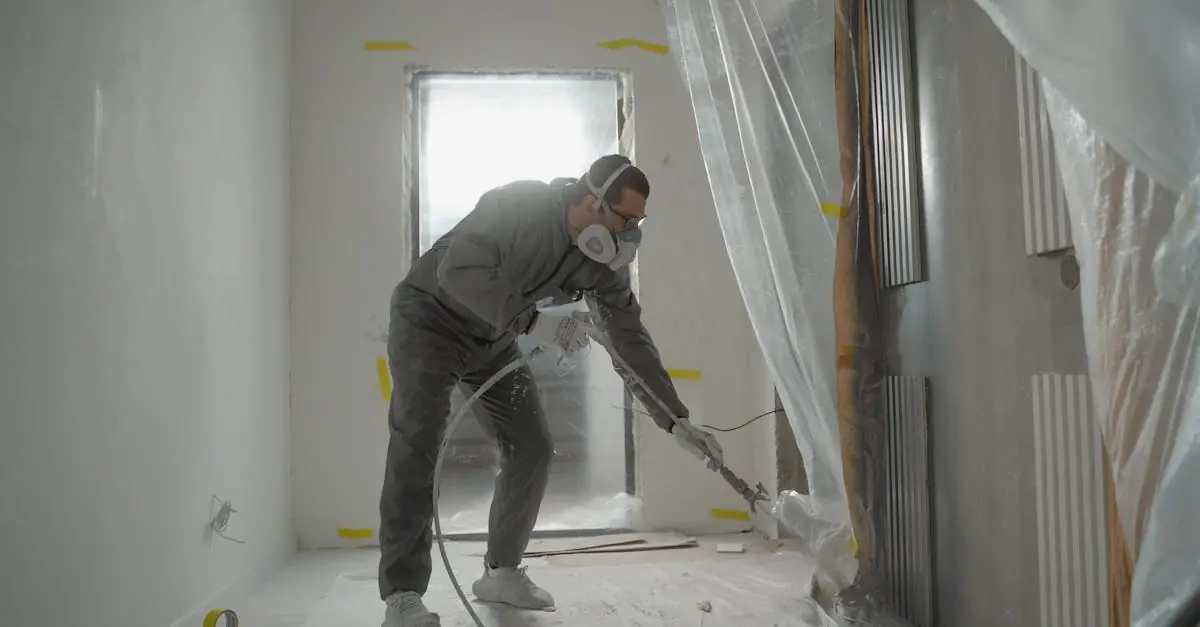In the bustling world of home improvement, getting the right contractor’s license in New Jersey isn’t just a formality; it’s your golden ticket to transforming homes and dreams. Whether it’s a kitchen that needs a facelift or a backyard begging for a makeover, having that license means you can strut into any job site with confidence—like a superhero with a tool belt.
Table of Contents
ToggleOverview of Home Improvement Contractor License NJ
Obtaining a home improvement contractor license in New Jersey is vital for professionals engaging in construction and renovation projects. This licensed status provides legal authorization to perform various home improvement tasks, including kitchen renovations, bathroom upgrades, and landscaping alterations.
The New Jersey Division of Consumer Affairs oversees the licensing process. Applicants must fulfill specific criteria, which include maintaining a clean legal record and completing a business registration. Experience in construction-related fields is also beneficial for prospective license holders.
Contractors must carry a minimum of $500,000 in liability insurance, ensuring protection for both the contractor and the homeowner. This insurance requirement serves as an assurance against potential damages or accidents occurring during a project.
Additionally, contractors are obligated to register with the New Jersey Contractor Registration Act. This further ensures accountability and consumer protection within the industry. Violations of this act can lead to substantial fines and penalties.
Renewing the license every two years requires ongoing compliance with regulations. Continuous education may also be required to stay updated on industry standards and practices.
With a valid home improvement contractor license, professionals demonstrate credibility and skill. Homeowners can trust licensed contractors to deliver safe, high-quality work, fostering a sense of security throughout the improvement process.
Requirements for Obtaining a License
Securing a home improvement contractor license in New Jersey involves meeting several key requirements. These ensure that contractors possess the necessary qualifications to perform their tasks effectively.
Age and Experience
Applicants must be at least 18 years old to apply for a home improvement contractor license. Experience plays a crucial role; having practical experience in construction or renovation enhances an applicant’s credibility. Many contractors gain hands-on skills through apprenticeships or working alongside seasoned professionals. This experience not only meets licensing criteria but also fosters competence during projects. Demonstrating a solid background in relevant fields is vital for establishing trust with clients.
Education and Training
Education and training requirements contribute significantly to obtaining a license. While formal education is not mandatory, vocational training can provide essential skills in construction techniques and safety protocols. Many contractors benefit from joining industry workshops and certification courses focused on best practices. Engaging in continuous education helps contractors stay current with industry standards. Additionally, training ensures compliance with local building codes and regulations, which is crucial for delivering quality workmanship.
Application Process
Obtaining a home improvement contractor license in New Jersey involves clear steps and necessary documentation. Applicants must prepare thoroughly to ensure smooth processing.
Necessary Documentation
First, submit proof of age, confirming the applicant is at least 18 years old. Next, provide documentation proving relevant construction experience, including work history or apprenticeship certificates. Evidence of business registration is crucial and should include a valid business name and address. Liability insurance documentation also must be submitted, showcasing at least $500,000 in coverage. All these documents help demonstrate credibility and compliance with state requirements, ensuring contractors meet industry standards.
Submission Steps
Start the submission process by completing an application, available through the New Jersey Division of Consumer Affairs. Next, gather all required documents and submit them together, either online or by mail. Pay the application fee when submitting, which varies based on the contractor’s business type. After submission, expect a review period during which the Division of Consumer Affairs assesses the application. Respond promptly to any requests for additional information to avoid delays and ensure a timely approval of the license.
Types of Licenses Available
New Jersey offers various types of licenses for home improvement contractors, ensuring that professionals meet specific standards and regulations. Understanding these licenses helps contractors align their qualifications with industry requirements.
General Home Improvement License
The General Home Improvement License is the primary license for contractors working on renovation projects. This license allows professionals to engage in a wide range of tasks, including kitchen remodels and bathroom updates. Applicants must show proof of relevant experience and complete necessary documentation. Liability insurance, covering at least $500,000, serves to protect both contractors and homeowners. Renewing this license every two years ensures ongoing compliance with state regulations.
Specialty Licenses
Specialty Licenses cater to specific trades within the construction industry. Electricians, plumbers, and HVAC technicians often require these licenses to perform specialized work legally. Each specialty license necessitates meeting additional qualifications, such as passing relevant exams or demonstrating extensive knowledge in the field. Obtaining a specialty license enhances credibility and allows contractors to take on more complex projects, ultimately expanding their service offerings. Maintaining these licenses involves following industry updates and ensuring compliance with local regulations.
Benefits of Being Licensed
Being licensed as a home improvement contractor in New Jersey offers significant advantages. First, credibility increases when contractors possess a valid license, instilling trust in homeowners. Licensing indicates adherence to local regulations and professional standards, serving as a guarantee of quality work.
Contractors gain access to various projects by holding a home improvement contractor license. This access allows them to undertake jobs ranging from kitchen renovations to complete home remodels. Having this credential also facilitates networking with other professionals in the industry, opening doors to collaborative opportunities.
Liability insurance coverage is another essential benefit. Contractors are required to maintain a minimum of $500,000 in liability insurance, which protects both the contractor and the homeowner from potential accidents or damages. Homeowners feel more secure knowing their contractor has adequate insurance.
Compliance with state regulations becomes easier with licensure. Contractors must meet the requirements set forth by the New Jersey Division of Consumer Affairs, ensuring they stay updated on industry standards. Failing to comply can lead to fines or penalties, making it critical for contractors to maintain their licenses.
Ongoing education also accompanies licensure. Many licensed contractors engage in continued education to stay informed about the latest building codes and safety protocols. This proactive approach enhances their skills and assures clients of their commitment to high-quality workmanship.
Further, being licensed opens possibilities for specialty licenses within specific trades, such as plumbing or electrical work. These additional credentials allow contractors to expand their service offerings and tackle more complex projects, increasing their marketability. Ultimately, holding a home improvement contractor license is a strategic move that bolsters a contractor’s reputation and authority in the field.
Consequences of Working Without a License
Working without a home improvement contractor license in New Jersey leads to significant risks. Contractors face hefty fines, often exceeding $10,000 for unregistered operations. Damage to reputation occurs quickly since homeowners typically avoid unlicensed workers due to concerns over legitimacy.
Claiming to offer licensed services without proper credentials can result in serious legal problems. Homeowners may seek compensation for any work deemed unsatisfactory, leading to costly disputes in court. Without a license, contractors also lack access to essential insurance coverage, leaving them personally liable for accidents or damages incurred during a project.
Failure to comply with state regulations results in penalties and potential loss of future work opportunities. Many homeowners require verification of a contractor’s license before hiring. Hence, unlicensed contractors miss out on numerous projects simply due to the lack of credibility.
Contracting without a license can complicate relationships with clients and other professionals. Licensed contractors are viewed as trustworthy and accountable, while unlicensed counterparts often struggle to gain that level of confidence. Compliance with local building codes and safety protocols is unverified for unlicensed individuals, further diminishing their appeal.
Long-term consequences include difficulties in establishing a sustainable business. Many reputable suppliers and subcontractors refuse to work with unlicensed contractors, creating barriers to success. By not obtaining a proper license, contractors limit their potential for growth and profitability.
Securing a home improvement contractor license in New Jersey is a crucial step for anyone looking to thrive in the construction and renovation industry. This license not only enhances a contractor’s credibility but also ensures compliance with state regulations, providing peace of mind to homeowners. By investing in the necessary training and maintaining proper documentation, contractors can position themselves for success in a competitive market.
The benefits of being licensed extend beyond legal compliance; they foster trust and reliability, essential qualities for building lasting client relationships. Ultimately, obtaining and maintaining a home improvement contractor license is a strategic move that can lead to greater opportunities and growth within the industry.




